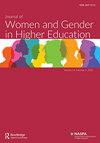Microaggressions and Mental Health at the Intersections of Race, Gender, and Sexual Orientation in Graduate and Law School
Q2 Social Sciences
Journal of Women and Gender in Higher Education
Pub Date : 2022-04-03
DOI:10.1080/26379112.2022.2068149
引用次数: 1
Abstract
There is a proliferation of research on the effects of microaggressions among undergraduate students and in the workplace. However, scholars have not focused on biased interactions among graduate and law students, their capacity to create or exacerbate health inequities, and the types of support that might mitigate these effects. In two studies, we center minoritized graduate and law students—those who identify as women, LGBQ+, and/or people of color. We explore how marginalization produced by sexism, homonegativity, and racism increase the risk of microaggressions and mental health symptoms in a non-representative sample of 2,051 cisgender graduate and law students enrolled in a predominantly white research university in the southeastern United States. We find that white heterosexual men report significantly fewer types of microaggressions during graduate and law school, especially as compared to women and LGBQ+ people of color. In turn, experiencing more microaggressions produces greater depression and anxiety among members of these groups. However, we also find that adequate support and encouragement from an academic advisor and from one’s academic department are associated with decreases in some mental health symptoms, even at follow-up nine months later. We add to a small but growing literature that focuses on stressors and mental health symptoms experienced by graduate and law students while demonstrating the need for understanding their unique effects on LGBQ+ students, men and women of color, and those who are multiply minoritized in academia.研究生和法学院种族、性别和性取向交叉点的微侵犯与心理健康
在本科生和工作场所中,关于微侵犯的影响的研究越来越多。然而,学者们并没有关注研究生和法律学生之间有偏见的互动,他们创造或加剧健康不平等的能力,以及可能减轻这些影响的支持类型。在两项研究中,我们以少数族裔研究生和法律学生为中心——那些自认为是女性、LGBQ+和/或有色人种的学生。我们对美国东南部一所以白人为主的研究型大学的2051名异性恋研究生和法律专业学生的非代表性样本进行研究,探讨性别歧视、同性恋否定和种族主义所产生的边缘化是如何增加微侵犯和心理健康症状的风险的。我们发现,白人异性恋男性在研究生和法学院期间遭受的微侵犯类型明显减少,尤其是与女性和LGBQ+有色人种相比。反过来,经历更多的微侵犯会使这些群体的成员产生更大的抑郁和焦虑。然而,我们也发现,来自学术顾问和学术部门的充分支持和鼓励与某些心理健康症状的减少有关,即使在九个月后的随访中也是如此。我们增加了一个小但不断增长的文献,关注研究生和法律专业学生经历的压力源和心理健康症状,同时展示了了解它们对LGBQ+学生、有色人种男女以及学术界少数群体的独特影响的必要性。
本文章由计算机程序翻译,如有差异,请以英文原文为准。
求助全文
约1分钟内获得全文
求助全文
来源期刊

Journal of Women and Gender in Higher Education
Social Sciences-Gender Studies
CiteScore
1.40
自引率
0.00%
发文量
20
 求助内容:
求助内容: 应助结果提醒方式:
应助结果提醒方式:


